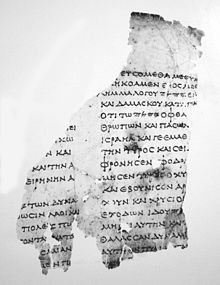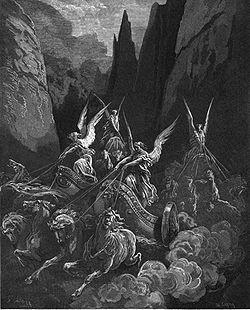
The Book of Amos is the third of the Twelve Minor Prophets in the Old Testament (Tanakh) and the second in the Greek Septuagint tradition. According to the Bible, Amos was an older contemporary of Hosea and Isaiah, and was active c. 750 BC during the reign of Jeroboam II of Samaria, while Uzziah was King of Judah. Amos is said to have lived in the kingdom of Judah but preached in the northern Kingdom of Israel where themes of social justice, God's omnipotence, and divine judgment became staples of prophecy. In recent years, scholars have grown more skeptical of The Book of Amos’ presentation of Amos’ biography and background. It is known for its distinct “sinister tone and violent portrayal of God.”
The Book of Haggai is a book of the Hebrew Bible or Tanakh, and is the third-to-last of the Twelve Minor Prophets. It is a short book, consisting of only two chapters. The historical setting dates around 520 BC, before the Temple had been rebuilt. The original text was written in Biblical Hebrew.
The Book of Malachi is the last book of the Neviim contained in the Tanakh, canonically the last of the Twelve Minor Prophets. In most Christian orderings, the grouping of the prophetic books is the last section of the Old Testament, making Malachi the last book before the New Testament.
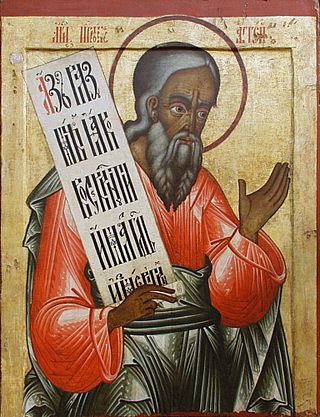
Haggai or Aggeus was a Hebrew prophet active during the building of the Second Temple in Jerusalem, one of the twelve minor prophets in the Hebrew Bible, and the author or subject of the Book of Haggai. He is known for his prophecy in 520 BCE, commanding the Jews to rebuild the Temple. He was the first of three post-exilic prophets from the Neo-Babylonian Exile of the House of Judah, who belonged to the period of Jewish history which began after the return from captivity in Babylon. His name means "my holidays".
The Nevi'im is the second major division of the Hebrew Bible, lying between the Torah and Ketuvim. The Nevi'im are divided into two groups. The Early Prophets consists of the narrative books of Joshua, Judges, Samuel and Kings; while the Latter Prophets include the books of Isaiah, Jeremiah, Ezekiel, and the Twelve Brief Prophets.

Zerubbabel was, according to the Hebrew Bible, a governor of the Achaemenid Empire's province of Yehud and the grandson of Jeconiah, penultimate king of Judah. He is not documented in extra-biblical documents, and is considered by Sarah Schulz of the University of Erlangen–Nuremberg as historically plausible, but probably not an actual governor of the province, much like Nehemiah.
The Twelve Minor Prophets, or the Book of the Twelve, is a collection of prophetic books, written between about the 8th and 4th centuries BCE, which are in both the Jewish Tanakh and Christian Old Testament.

Zechariah 4 is the fourth of the 14 chapters in the Book of Zechariah in the Hebrew Bible or the Old Testament of the Christian Bible. This book contains the prophecies attributed to the prophet Zechariah. In the Hebrew Bible it forms part of the Book of the Twelve Minor Prophets. This chapter relates Zechariah's fifth vision. It is a part of a section consisting of Zechariah 1–8.

Zechariah 3 is the third of the 14 chapters in the Book of Zechariah in the Hebrew Bible or the Old Testament of the Christian Bible. This book contains the prophecies attributed to the prophet Zechariah. In the Hebrew Bible it forms part of the Book of the Twelve Minor Prophets. This chapter records a vision of Joshua, the high priest, being cleansed before God. It is a part of a section consisting of Zechariah 1–8.
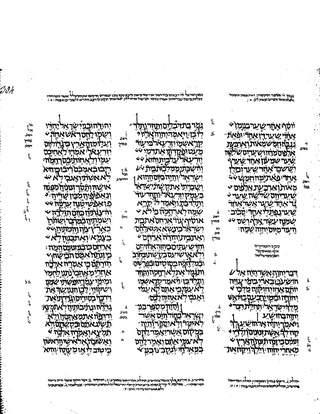
Zechariah 2 is the second of the 14 chapters in the Book of Zechariah in the Hebrew Bible or the Old Testament of the Christian Bible. This book contains the prophecies attributed to the prophet Zechariah. In the Hebrew Bible it forms part of the Book of the Twelve Minor Prophets. This chapter is a part of a section consisting of Zechariah 1–8. It records the third of eight visions received by the prophet, followed by an oracle calling the exiles to return to the city where Yahweh is about to dwell and all nations will come.

Zechariah 1 is the first chapter of the Book of Zechariah in the Hebrew Bible or the Old Testament of the Christian Bible. This book contains the prophecies attributed to the prophet Zechariah. In the Hebrew Bible it forms a part of the Book of the Twelve Minor Prophets. As the first of the 14 chapters in the book, this chapter is a part of a section consisting of Zechariah 1-8. It records an introduction and the first two of the eight visions received by the prophet. These visions are the book's primary and most distinctive feature, with a highly literary and standardized format, structured in a concentric pattern.

Zechariah 5 is the fifth of the 14 chapters in the Book of Zechariah in the Hebrew Bible or the Old Testament of the Christian Bible. This book contains the prophecies attributed to the prophet Zechariah. In the Hebrew Bible it forms a part of the Book of the Twelve Minor Prophets. This chapter records the sixth and seventh of the eight visions of Zechariah, the flying scroll and the woman in a basket, which are compiled in a section consisting of Zechariah 1–8.

Zechariah 6 is the sixth of the 14 chapters in the Book of Zechariah in the Hebrew Bible or the Old Testament of the Christian Bible. This book contains the prophecies attributed to the prophet Zechariah. In the Hebrew Bible it is part of the Book of the Twelve Minor Prophets. This chapter contains a description of Zechariah's eighth and final vision, and the crowning of Joshua the High Priest. It is a part of a section consisting of Zechariah 1–8.
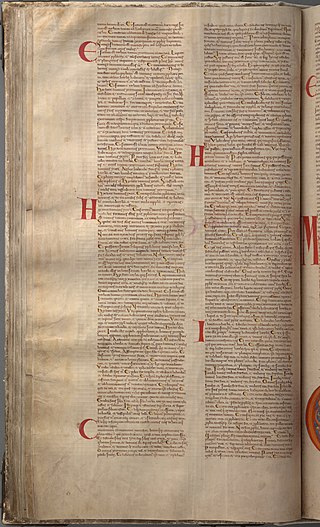
Zechariah 7 is the seventh of the 14 chapters in the Book of Zechariah in the Hebrew Bible or the Old Testament of the Christian Bible. This book contains the prophecies attributed to the prophet Zechariah. In the Hebrew Bible it is part of the Book of the Twelve Minor Prophets. This chapter is a part of a section consisting of Zechariah 1–8. The Jews having sent to inquire concerning the set fasts, Zechariah 7:1-3, Zechariah reproves the hypocrisy of their fasts, Zechariah 7:4-7, and they are exhorted by repentance to remove the cause of their calamity, Zechariah 7:8-14.
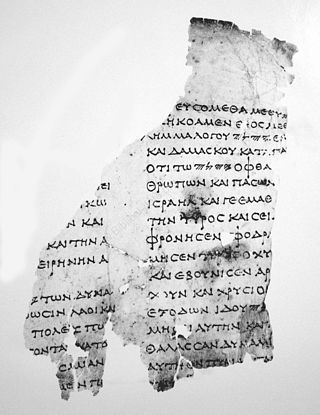
Zechariah 8 is the eighth of the 14 chapters in the Book of Zechariah in the Hebrew Bible or the Old Testament of the Christian Bible. This book contains the prophecies attributed to the prophet Zechariah. In the Hebrew Bible it is part of the Book of the Twelve Minor Prophets. This chapter concludes the so-called "First Zechariah", consisting of Zechariah 1–8, and brings together ten "short independent oracles", each referring to the word of "the Lord of Hosts".
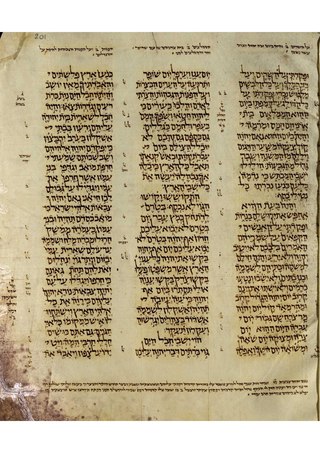
Zechariah 9 is the ninth of the 14 chapters in the Book of Zechariah in the Hebrew Bible or the Old Testament of the Christian Bible. This book contains the prophecies attributed to the prophet Zechariah. In the Hebrew Bible it is part of the Book of the Twelve Minor Prophets. This chapter opens the so-called "Second Zechariah" portion, consisting of Zechariah 9–14, which was composed "long after the previous portions of the book". It concerns the advance of an enemy, but God defends Jerusalem and promises that his king will triumphantly enter the city to bring peace among all nations. This chapter also contains a continuation of the subject in the seventh chapter. The oracle referring to the king's entry into Jerusalem is quoted in the New Testament in the accounts of Jesus' triumphal entry into Jerusalem.

Zechariah 11 is the eleventh of the 14 chapters in the Book of Zechariah in the Hebrew Bible or the Old Testament of the Christian Bible. This book contains the prophecies attributed to the prophet Zechariah. In the Hebrew Bible it is part of the Book of the Twelve Minor Prophets. This chapter is a part of a section consisting of Zechariah 9–14, attributed to the so-called "Second Zechariah", an anonymous successor to the Zechariah of chapters 1-8.

Zechariah 13 is the thirteenth of the 14 chapters in the Book of Zechariah in the Hebrew Bible or the Old Testament of the Christian Bible. This book contains the prophecies attributed to the prophet Zechariah. In the Hebrew Bible it is part of the Book of the Twelve Minor Prophets. This chapter is a part of a section consisting of Zechariah 9–14. Verses 1–6 may be seen as continuous with chapter 12, whereas verses 7–9 form a separate "invocation", forming a three-section "entity" with 14:1-21.

Jeremiah 18 is the eighteenth chapter of the Book of Jeremiah in the Hebrew Bible or the Old Testament of the Christian Bible. This book contains prophecies attributed to the prophet Jeremiah, and is one of the Books of the Prophets. This chapter includes the fourth of the passages known as the "Confessions of Jeremiah".

Ezra 5 is the fifth chapter of the Book of Ezra in the Old Testament of the Christian Bible, or the book of Ezra–Nehemiah in the Hebrew Bible, which treats the book of Ezra and book of Nehemiah as one book. Jewish tradition states that Ezra is the author of Ezra–Nehemiah as well as the Book of Chronicles, modern scholars generally claim that a compiler from the 5th century BCE is the final author of these books. The section comprising chapter 1 to 6 describes the history before the arrival of Ezra to the land of Judah in 468 BCE. This chapter records the contribution of the prophets Haggai and Zechariah to the temple building project and the investigation by Persian officials.

